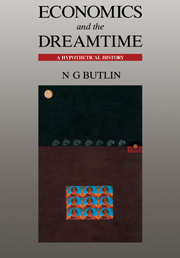Book contents
- Frontmatter
- Contents
- Preface
- Acknowledgements
- Figures
- Maps
- Tables
- Introduction
- Part I The palaeoeconomic history of Aboriginal migration
- Part II Development, structure and function of Aboriginal economy
- 7 Introduction
- 8 The process of early settlement
- 9 Variety in the precontact Aboriginal economy
- 10 The nature and function of Aboriginal economy
- 11 Dynamic elements in the Aboriginal economy
- Part III Disease, economics and demography
- Part IV The establishment of a bridgehead economy: 1788–1810
- Part V The takeover process: 1788–1850
- Bibliography
- Appendix 1 Preliminary model/checklist of Aboriginal migration to Australia
- Appendix 2 NOAA depth contour maps
- Index
10 - The nature and function of Aboriginal economy
Published online by Cambridge University Press: 06 July 2010
- Frontmatter
- Contents
- Preface
- Acknowledgements
- Figures
- Maps
- Tables
- Introduction
- Part I The palaeoeconomic history of Aboriginal migration
- Part II Development, structure and function of Aboriginal economy
- 7 Introduction
- 8 The process of early settlement
- 9 Variety in the precontact Aboriginal economy
- 10 The nature and function of Aboriginal economy
- 11 Dynamic elements in the Aboriginal economy
- Part III Disease, economics and demography
- Part IV The establishment of a bridgehead economy: 1788–1810
- Part V The takeover process: 1788–1850
- Bibliography
- Appendix 1 Preliminary model/checklist of Aboriginal migration to Australia
- Appendix 2 NOAA depth contour maps
- Index
Summary
We need to depart from a simple focus on either hunting and gathering, or even on Aborigines as resource managers, though the contrast between these two characterisations is essential in leading us into a consideration of dynamic and not merely static issues. Any general approach necessarily cuts across the detail and variety hinted at above. We do need to try to understand the nature and function of Aboriginal economy as a set of static relationships. But we need also to consider the possibility that, at the time of first European settlement, Aboriginal economy was developing rather than static. Moreover, it is important to bear in mind that even an apparently traditional and static economy contains dynamic elements.
A considerable number of characteristics of Aboriginal society need to be taken into account:
varied ends of order, security, insurance, communication, capital formation and maintenance (both human and physical), food, clothing, dwellings, leisure, ritual, ceremonial etc.;
omnivorous diet;
limited inter-group trade or exchange within bands;
more or less non-residential productive activity;
diurnal operation in small groups;
a marked, if not exclusive, division of labour by gender;
ordered learning-by-doing or ‘education’
limited and generally non-durable physical capital;
limited storage capacity;
land and resource management;
communal sharing rules;
communal property rights in land by small groups;
the practice of polygyny (implying concentrated property rights in women);
property rights in ritual;
population control;
complex kin relations;
formal non-literacy;
limited formal government.
[…]
- Type
- Chapter
- Information
- Economics and the DreamtimeA Hypothetical History, pp. 71 - 86Publisher: Cambridge University PressPrint publication year: 1993



